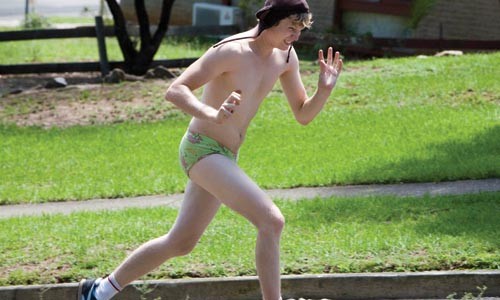The family of four at the center of Elissa Down's The Black Balloon is not like every other family, although for the sake of honoring their struggle, it's tempting to say that they are.
Simon, pregnant Maggie and almost-16-year-old Thomas (Rhys Wakefield) get along fine on their own. It's older brother Charlie (Luke Ford) who creates havoc: He's autistic, and severely so. He spoke for a while as a small child, but then he stopped. Now he hums and wails and pounds a wooden spoon on the floor, and he communicates with limited sign language, which a doting Maggie taught her special boy, who's grown very big and unruly.
In American hands, The Black Balloon would probably have been a more pat and clinical drama. But Down, like her cast (which includes, as Maggie, the always-superb Toni Collette), is Australian, and that leads her film to slightly more challenging highs and lows: Australian cinema is especially good at casting very dark shadows over bright sunny days.
Down defines each of her characters well, although she barely develops them, and it's Thomas who dominates. He loves his brother, and he takes responsibility for looking after him when it's his turn. But he also wants a normal life, one where the kids at school don't call his brother names, and where the nasty neighbors don't call family services when they hear a melee next door.
Thank goodness for Thomas that Charlie, who runs away from home wearing only his underpants, chooses to break into the home of Thomas' very pretty, very tolerant classmate Jackie -- and that she's in the shower when Charlie enters the bathroom to pee! This leads to a romance between Thomas and Jackie, who's impossibly compassionate and patient.
The Black Balloon doesn't spare us the experience of Charlie at his worst. Locked in his bedroom -- Thomas wants a moment alone with Jackie -- he lets loose his bowels, then smears the results all over himself and the carpet. In a supermarket, Simon has to put some items back, and this so upsets Charlie they have to drag him away. How does a family cope with this? How does a teen-ager like Thomas face the world after such embarrassment? The answer, somewhat unsatisfying in the end, is: They just do (although the eccentric Simon occasionally talks to the family through Rex, a stuffed bear).
Down never once tries to explain Charlie's behavior. It's simply how he is. Would explanations help? They might comfort us with the knowledge that some science book somewhere has documented his condition. But they wouldn't make life easier for the Mollisons, and that seems to be the point. This family, like every other family coping with autism, is sui generis. The drama's climax, where Thomas reaches his breaking point, is organic and harrowing -- the moment we anticipate as we witness their stressful lives. And then, to end, sunshine again, perhaps a bit unbelievably, as life goes on.
![]()
Starts Fri., Feb. 27. Harris


